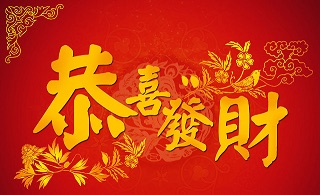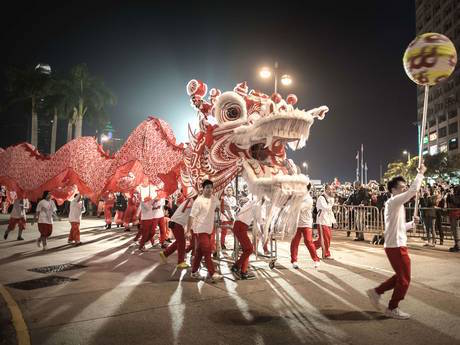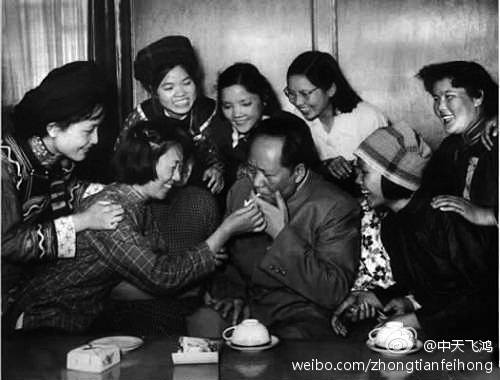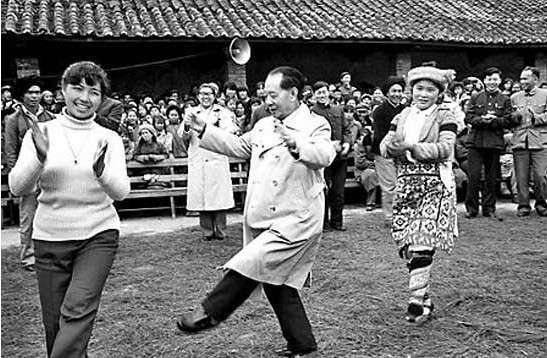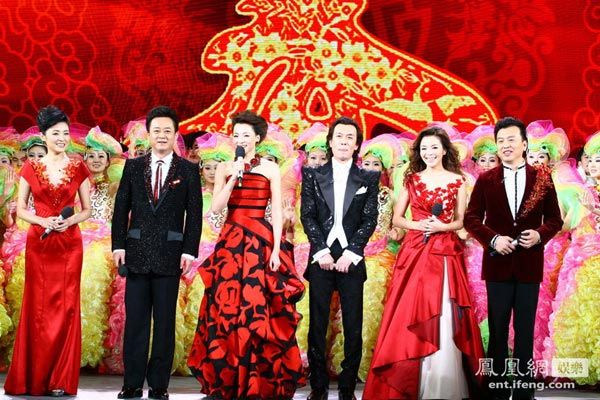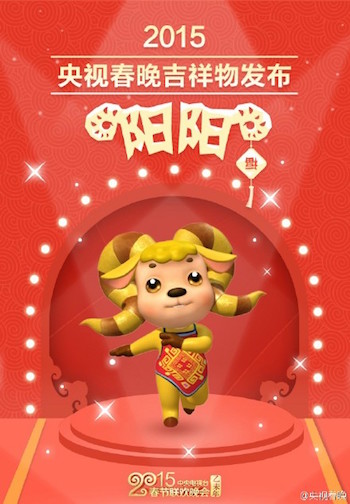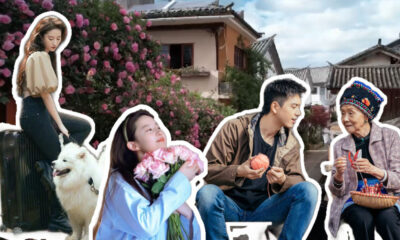China Insight
35 Facts About Chinese New Year
Chinese New Year has arrived. We are saying goodbye to the year of the Horse, and welcome the year of the Goat. Did you know that New Year was once cancelled by the government? Or that Xinjiang people receive “anti-extremist” New Year’s calendars? What’s on Weibo brings you 35 facts about Chinese New Year.
Published
9 years agoon
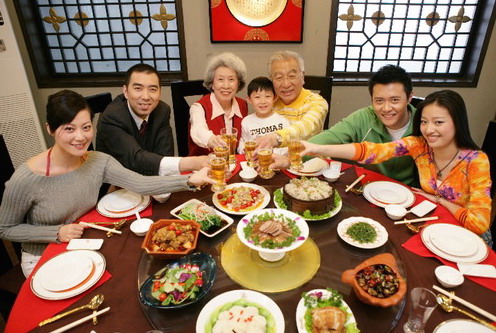
Chinese New Year has arrived. It is the most important Chinese festival of the year, and the anticipation starts weeks before it starts. Trending topics on Sina Weibo during this period include “going home”, “not able to go home”, “meeting the family-in-law” or “red envelope” (hongbao, monetary gifts during festivities). Did you know that Chinese New Year was once cancelled by the government? Or that Xinjiang people receive “anti-extremist” New Year’s calendars? What’s on Weibo brings you 35 facts about Chinese New Year.
1 * Chinese New Year has been celebrated for over 3000 years (Li 2006, ch.1).
2 * Chinese New Year is based on the lunar calendar, and begins on a different date every year; always in January or February. It lasts for fifteen days, until the night of the full moon. It usually falls near the first day of spring, hence it is also called the Spring Festival (Smith 2000).
3 * ‘Spending New Year’ in Chinese is ‘guo nian‘ (过年, nian meaning ‘year’). According to Chinese legend, the origins of Spring Festival can be found in the battle against the Nian, a fierce and hungry man-eating beast. Except for ‘spending New Year’, ‘guo nian‘ hence also means the ‘passing of the beast’.
4 * Except for the Han (China’s greatest ethnic group) Spring Festival is also celebrated by 38 other minorities (Li 2006, ch.1).
5 *Gong Xi Fa Cai (Mandarin) or Kung Hei Fat Choy (Cantonese) are the most common ways to say ‘Happy New Year’ in Chinese (恭喜发财).
6 * Fireworks are an integral part of Chinese New Year. Traditionally, the noise and fire is supposed to ward off evil spirits and bad luck.
7 * Due to worsening air pollution in China’s big cities over the past years, the enthusiasm for fireworks has curbed as the government has started anti-firework campaigns.
8 * 2015 is the Year of the Goat. It starts on February 19th and lasts until February 7th, 2016. Those with birth years 1907, 1919, 1931, 1943, 1955, 1967, 1979, 1991, 2003 and 2015 are said to have been born in the year of the Goat (Sabin 2015).
9 * The Chinese character for goat 羊 (yang) can mean either ram, sheep or goat- leading to much confusion on what kind of year this actually is. According to one Chinese linguist, the only right translation is goat: it is the goat that belongs in the Chinese zodiac, as it was one of the animals that was commonly eaten in ancient China, along with other zodiac signs such as horses, cows, dogs, pigs and chickens.
10 * The Year of the Goat is marked by positive changes. In terms of culture and arts it promises cool fashion, new styles and bright colors. In terms of politics, reconciliation plays an important role in the Year of the Goat. This will be a year for peace, dialogue and understanding (Sommerville 2014).
11 * The dragon dance is a form of traditional performance seen during the Chinese New Year. The dragon is believed to bring good luck. The Beijing Aquarium even holds underwater dragon dances.
12 * Ahead of the festivities, there is a mass exodus within China: 2.8 billion trips are made across the country so that people can go back to their hometowns to see friends and families to celebrate Chinese New Year together (Sabin 2015).
13 * Before the festival, people clean their house. They should not clean their house on the first two days of the New Year, as it is considered bad luck to “sweep away good luck” (Sabin 2015). Similarly, people also should not wash their hair during the first two days of the new year.
14 * The color red is the central color of Spring Festival: red is believed to bring good luck and scare away evil spirits. Red is a dominant color in clothing and paper decoration during the festivities (Smith 2000).
15 * During the festivities, there are many traditional snacks and dishes. Sticky cakes and dumplings are commonly eaten throughout these days. If you’re lucky, you might find a coin in your dumpling.
16 * Besides all kinds of delicacies, long noodles are also often eaten during Chinese New Year as they represent longevity.
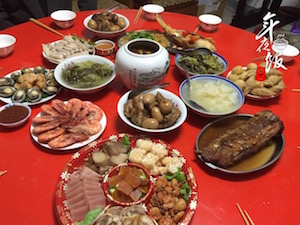 “Preparing for New Year dinner with the family,” says one Weibo user, posting this picture.
“Preparing for New Year dinner with the family,” says one Weibo user, posting this picture.
17 * Mao Zedong was praised for celebrating Chinese New Year together with the common people (see image).
18 * In 1986,high-ranking official Hu Yaobang celebrated Chinese New Year in the southern province of Yunnan. In the featured image, Hu Yaobang dances traditional ethnic dance together with locals (360doc).
19 * The year-end bonus (年终奖金) is an important issue during Chinese New Year. Some employees receive large amounts of money from their companies, others are disappointed with what they get.
20 * Most text messages are sent during Chinese New Year. The current record stands at 19 billion.
21 * If you mention ‘Chinese New Year’ on Weixin, small moneybags fall drop down in the screen.
22 * The best-watched television show during New Year’s is the Spring Festival Eve television gala by CCTV. With an estimated 800 million viewers, this show has the largest audience for any entertainment show in the world, surpassing the Super Bowl.
23 * The first Spring Festival Eve television gala took place in 1983. The show consists of different acts, including comedy sketches (Bin 1998, 220).
24 * This year, Weibo users can watch the live broadcasting of the television gala while commenting and interacting with other Weibo users without switching screens.
25 * Before New Year’s, Hong Kong hospitals filled up with expecting mothers waiting for a caesarean section in order to make sure their babies were still born in the Year of the Horse, as it is considered a good year to have children.
26 * It is tradition to burn paper money or ‘ghost money’ during the festivities as offerings to the spirits and deceased. The paper money is sometimes made from rice paper, but silver or gold metallic paper is also common.
27 * Doctors have warned people to wear face masks when burning metallic money, as the substances that are produced when burning this money are a potential health risk.
28 * For many young single men and women, Chinese New Year is the period when they receive the most pressure from their parents to get married. Over recent years, a trend has come up where single women rent a date to take home to their parents in order to avoid critical questions on their single status.
29 * The pressure to get married is especially difficult for Chinese gays who have not come out. A Chinese gay rights organisation has therefore launched a video titled ‘Coming Home‘, urging gays to talk to their families and telling parents to be supportive during Spring Festival.
30 * A new year means a new calendar. Giving a calendar is tradition during Chinese New Year.
31 * This year, the government is giving away “anti-extremism” calendars in Urumqi in the northwestern region of Xinjiang, home to China’s Muslim Uighur population (also read: Islam in China).
32 * You might see a lot of people eating oranges and pomelo’s during New Year. The Chinese words for oranges and tangerines (橘, 桔: ju) sound like ‘luck’ (吉, ji), while pomelo (柚, you) sounds like ‘to have’ (有 you). Eating pomelo’s and oranges is thus considered to bring good luck.
33 * The Year of the Goat has a ‘mascot’ this year. Yangyang the Goat was revealed on the Weibo account of CCTV’s Spring Festival television gala. It is the first time the Spring Festival gala has a mascot.
34 * Chinese New Year was officially cancelled in 1967 at the time of the Cultural Revolution, as it was believed that the festivities would distract the people from their “revolutionary duties”.
35 * Besides all the do’s, there are also specific don’ts during Spring Festival: do not give clocks as presents, because they symbolise time running out, avoid the use of sharp objects, as they might cut off good fortune, and do not wear black or tell ghost stories, as it might bring about negative energy (John 2015).
– by Manya Koetse
[button link=”http://www.twitter.com/whatsonweibo” type=”icon” icon=”heart” newwindow=”yes”] Follow us on Twitter[/button]
References
Bin, Zhao. 1998. “Popular Family Television and Party Ideology: The Spring Festival Eve Happy Gathering.” Journal of Composite Materials 33: 928–40.
Chey, Ong Siew. 2011. China Condensed: 5,000 Years of History & Culture. Singapore: Marshall Cavendish International Asia Pte Ltd.
John, Simi. 2015. “Chinese New Year 2015: Top ten superstitions.” International Business Times, February 17 http://www.ibtimes.co.uk/chinese-new-year-2015-top-ten-superstitions-1488173 [18.02.15].
Sabin, Lamiat. 2015. “Chinese New Year 2015: When is it, how is it celebrated – and what does the Goat signify?” The Independent, Feb 17 http://www.independent.co.uk/news/world/asia/chinese-new-year-2015-when-is-it-how-is-it-celebrated–and-what-does-the-goat-signify-10049702.html [17.02.15].
Smith, Christine. 2000. Chinese New Year Activities. Teacher Created Resources. https://books.google.com/books?id=whFBVSNN_ZkC&pgis=1.
Somerville, Neil. 2014. The Goat in 2015: Your Chinese Horoscope. HarperCollins Publishers. https://books.google.com/books?id=lrzpAgAAQBAJ&pgis=1.
Xing, Li. 2006. Festivals of China’s Ethnic Minorities. China Intercontinental Press 中信出版社.
©2015 Whatsonweibo. All rights reserved. Do not reproduce our content without permission – you can contact us at info@whatsonweibo.com.
Manya Koetse is the founder and editor-in-chief of whatsonweibo.com. She is a writer, public speaker, and researcher (Sinologist, MPhil) on social trends, digital developments, and new media in an ever-changing China, with a focus on Chinese society, pop culture, and gender issues. She shares her love for hotpot on hotpotambassador.com. Contact at manya@whatsonweibo.com, or follow on Twitter.

China Insight
The Tragic Story of “Fat Cat”: How a Chinese Gamer’s Suicide Went Viral
The story of ‘Fat Cat’ has become a hot topic in China, sparking widespread sympathy and discussions online.
Published
3 months agoon
May 9, 2024
The tragic story behind the recent suicide of a 21-year-old Chinese gamer nicknamed ‘Fat Cat’ has become a major topic of discussion on Chinese social media, touching upon broader societal issues from unfair gender dynamics to businesses taking advantage of grieving internet users.
The story of a 21-year-old Chinese gamer from Hunan who committed suicide has gone completely viral on Weibo and beyond this week, generating many discussions.
In late April of this year, the young man nicknamed ‘Fat Cat’ (胖猫 Pàng Māo, literally fat or chubby cat), tragically ended his life by jumping into the river near the Chongqing Yangtze River Bridge (重庆长江大桥) following a breakup with his girlfriend. By now, the incident has come to be known as the “Fat Cat Jumping Into the River Incident” (胖猫跳江事件).
News of his suicide soon made its rounds on the internet, and some bloggers started looking into what was behind the story. The man’s sister also spoke out through online channels, and numerous chat records between the young man and his girlfriend emerged online.
One aspect of his story that gained traction in early May is the revelation that the man had invested all his resources into the relationship. Allegedly, he made significant financial sacrifices, giving his girlfriend over 510,000 RMB (approximately 71,000 USD) throughout their relationship, in a time frame of two years.
When his girlfriend ended the relationship, despite all of his efforts, he was devastated and took his own life.
The story was picked up by various Chinese media outlets, and prominent social and political commentator Hu Xijin also wrote a post about Fat Cat, stating the sad story had made him tear up.
As the news spread, it sparked a multitude of hashtags on Weibo, with thousands of netizens pouring out their thoughts and emotions in response to the story.
Playing Games for Love
The main part of this story that is triggering online discussions is how ‘Fat Cat,’ a young man who possessed virtually nothing, managed to provide his girlfriend, who was six years older, with such a significant amount of money – and why he was willing to sacrifice so much in order to do so.
The young man reportedly was able to make money by playing video games, specifically by being a so-called ‘booster’ by playing with others and helping them get to a higher level in multiplayer online battle games.
According to his sister, he started working as a ‘professional’ video gamer as a means of generating money to satisfy his girlfriend, who allegedly always demanded more.
He registered a total of 36 accounts to receive orders to play online games, making 20 yuan per game (about $2.80). Because this consumed all of his time, he barely went out anymore and his social life was dead.
In order to save more money, he tried to keep his own expenses as low as possible, and would only get takeout food for himself for no more than 10 yuan ($1,4). His online avatar was an image of a cat saying “I don’t want to eat vegetables, I want to eat McDonald’s.”

The woman in question who he made so many sacrifices for is named Tan Zhu (谭竹), and she soon became the topic of public scrutiny. In one screenshot of a chat conversation between Tan and her boyfriend that leaked online, she claimed she needed money for various things. The two had agreed to get married later in this year.
Despite of this, she still broke up with him, driving him to jump off the bridge after transferring his remaining 66,000 RMB (9135 USD) to Tan Zhu.
As the story fermented online, Tan Zhu also shared her side of the story. She claimed that she had met ‘Fat Cat’ over two years ago through online gaming and had started a long distance relationship with him. They had actually only met up twice before he moved to Chongqing. She emphasized that financial gain was never a motivating factor in their relationship.
Tan additionally asserted that she had previously repaid 130,000 RMB (18,000 USD) to him and that they had reached a settlement agreement shortly before his tragic death.
Ordering Take-Out to Mourn Fat Cat
– “I hope you rest in peace.”
– “Little fat cat, I hope you’ll be less foolish in your next life.”
– “In your next life, love yourself first.”
These are just a few of the messages left by netizens on notes attached to takeout food deliveries near the Chongqing Yangtze River Bridge.

AI-generated image spread on Chinese social media in connection to the event.
As Fat Cat’s story stirred up significant online discussion, with many expressing sympathy for the young man who rarely indulged in spending on food and drinks, some internet users took the step of ordering McDonalds and other food delivery services to the bridge, where he tragically jumped from, in his honor.
This soon snowballed into more people ordering food and drinks to the bridge, resulting in a constant flow of delivery staff and a pile-up of take-out bags.

Delivery food on the bridge, photo via Weibo.
However, as the food delivery efforts picked up pace, it came to light that some of the deliveries ordered and paid for were either empty or contained something different; certain restaurants, aware of the collective effort to honor the young man, deliberately left the food boxes empty or substituted sodas or tea with tap water.

At least five restaurants were caught not delivering the actual orders. Chinese bubble tea shop ChaPanda was exposed for substituting water for milk tea in their cups. On May 3rd, ChaPanda responded that they had fired the responsible employee.
Another store, the Zhu Xiaoxiao Luosifen (朱小小螺蛳粉), responded on that they had temporarily closed the shop in question to deal with the issue. Chinese fast food chain NewYobo (牛约堡) also acknowledged that at least twenty orders they received were incomplete.
Fast food company Wallace (华莱士) responded to the controversy by stating they had dismissed the employees involved. Mixue Ice Cream & Tea (蜜雪冰城) issued an apology and temporarily closed one of their stores implicated in delivering empty orders.
In the midst of all the controversy, Fat Cat’s sister asked internet users to refrain from ordering take-out food as a means of mourning and honoring her brother.
Nevertheless, take-out food and flowers continued to accumulate near the bridge, prompting local authorities to think of ways of how to deal with this unique method of honoring the deceased gamer.
Gamer Boy Meets Girl
On Chinese social media, this story has also become a topic of debate in the context of gender dynamics and social inequality.
There are some male bloggers who are angry with Tan Zhu, suggesting her behaviour is an example of everything that’s supposedly “wrong” with Chinese women in this day and age.
Others place blame on Fat Cat for believing that he could buy love and maintain a relationship through financial means. This irked some feminist bloggers, who see it as a chauvinistic attitude towards women.
A main, recurring idea in these discussions is that young Chinese men such as Fat Cat, who are at the low end of the social ladder, are actually particularly vulnerable in a fiercely competitive society. Here, a gender imbalance and surplus of unmarried men make it easier for women to potentially exploit those desperate for companionship.
The story of Fat Cat brings back memories of ‘Mo Cha Official,’ a not-so-famous blogger who gained posthumous fame in 2021 when details of his unhappy life surfaced online.
Likewise, the tragic tale of WePhone founder Su Xiangmao (苏享茂) resurfaces. In 2017, the 37-year-old IT entrepreneur from Beijing took his own life, leaving behind a note alleging blackmail by his 29-year-old ex-wife, who demanded 10 million RMB (±1.5 million USD) (read story).
Another aspect of this viral story that is mentioned by netizens is how it gained so much attention during the Chinese May holidays, coinciding with the tragic news of the southern China highway collapse in Guangdong. That major incident resulted in the deaths of at least 48 people, and triggered questions over road safety and flawed construction designs. Some speculate that the prominence given to the Fat Cat story on trending topic lists may have been a deliberate attempt to divert attention away from this incident.
‘Fat Cat’ was cremated. His family stated their intention to take necessary legal steps to recover the money from his former girlfriend, but Tan Zhu reportedly already reached an agreement with the father and settled the case. Nevertheless, the case continues to generate discussions online, with some people wondering: “Is it over yet? Can we talk about something different now?”

Fat Cat images projected in Times Square
However, given that images of the ‘Fat Cat’ avatar have even appeared in Times Square in New York by now (Chinese internet users projected it on one of the big LED screens), it’s likely that this story will be remembered and talked about for some time to come.
UPDATE MAY 25
On May 20, local authorities issued a lengthy report to clarify the timeline of events and details surrounding the death of “Fat Cat,” which had attracted significant attention across China.
The report concluded that there was no fraud involved and that “Fat Cat” and his girlfriend were in a genuine relationship. Tan did not deceive “Fat Cat” for money; the transfers were voluntary. Furthermore, Tan returned most of the money to his parents.
The gamer’s sister is reportedly still being investigated for potentially infringing on Tan’s privacy by disclosing numerous private details to the public.
In the end, one thing is clear in this gamer’s tragic story, which is that there are no winners.
By Manya Koetse
– With contributions by Miranda Barnes and Ruixin Zhang
Independently reporting China trends for over a decade. Like what we do? Support us and get the story behind the hashtag by subscribing:
Spotted a mistake or want to add something? Please let us know in comments below or email us. First-time commenters, please be patient – we will have to manually approve your comment before it appears.
©2024 Whatsonweibo. All rights reserved. Do not reproduce our content without permission – you can contact us at info@whatsonweibo.com.
China Brands, Marketing & Consumers
A Brew of Controversy: Lu Xun and LELECHA’s ‘Smoky’ Oolong Tea
Chinese tea brand LELECHA faced backlash for using the iconic literary figure Lu Xun to promote their “Smoky Oolong” milk tea, sparking controversy over the exploitation of his legacy.
Published
3 months agoon
May 3, 2024
It seemed like such a good idea. For this year’s World Book Day, Chinese tea brand LELECHA (乐乐茶) put a spotlight on Lu Xun (鲁迅, 1881-1936), one of the most celebrated Chinese authors the 20th century and turned him into the the ‘brand ambassador’ of their special new “Smoky Oolong” (烟腔乌龙) milk tea.
LELECHA is a Chinese chain specializing in new-style tea beverages, including bubble tea and fruit tea. It debuted in Shanghai in 2016, and since then, it has expanded rapidly, opening dozens of new stores not only in Shanghai but also in other major cities across China.
Starting on April 23, not only did the LELECHA ‘Smoky Oolong” paper cups feature Lu Xun’s portrait, but also other promotional materials by LELECHA, such as menus and paper bags, accompanied by the slogan: “Old Smoky Oolong, New Youth” (“老烟腔,新青年”). The marketing campaign was a joint collaboration between LELECHA and publishing house Yilin Press.

Lu Xun featured on LELECHA products, image via Netease.
The slogan “Old Smoky Oolong, New Youth” is a play on the Chinese magazine ‘New Youth’ or ‘La Jeunesse’ (新青年), the influential literary magazine in which Lu’s famous short story, “Diary of a Madman,” was published in 1918.
The design of the tea featuring Lu Xun’s image, its colors, and painting style also pay homage to the era in which Lu Xun rose to prominence.
Lu Xun (pen name of Zhou Shuren) was a leading figure within China’s May Fourth Movement. The May Fourth Movement (1915-24) is also referred to as the Chinese Enlightenment or the Chinese Renaissance. It was the cultural revolution brought about by the political demonstrations on the fourth of May 1919 when citizens and students in Beijing paraded the streets to protest decisions made at the post-World War I Versailles Conference and called for the destruction of traditional culture[1].
In this historical context, Lu Xun emerged as a significant cultural figure, renowned for his critical and enlightened perspectives on Chinese society.
To this day, Lu Xun remains a highly respected figure. In the post-Mao era, some critics felt that Lu Xun was actually revered a bit too much, and called for efforts to ‘demystify’ him. In 1979, for example, writer Mao Dun called for a halt to the movement to turn Lu Xun into “a god-like figure”[2].
Perhaps LELECHA’s marketing team figured they could not go wrong by creating a milk tea product around China’s beloved Lu Xun. But for various reasons, the marketing campaign backfired, landing LELECHA in hot water. The topic went trending on Chinese social media, where many criticized the tea company.
Commodification of ‘Marxist’ Lu Xun
The first issue with LELECHA’s Lu Xun campaign is a legal one. It seems the tea chain used Lu Xun’s portrait without permission. Zhou Lingfei, Lu Xun’s great-grandson and president of the Lu Xun Cultural Foundation, quickly demanded an end to the unauthorized use of Lu Xun’s image on tea cups and other merchandise. He even hired a law firm to take legal action against the campaign.
Others noted that the image of Lu Xun that was used by LELECHA resembled a famous painting of Lu Xun by Yang Zhiguang (杨之光), potentially also infringing on Yang’s copyright.
But there are more reasons why people online are upset about the Lu Xun x LELECHA marketing campaign. One is how the use of the word “smoky” is seen as disrespectful towards Lu Xun. Lu Xun was known for his heavy smoking, which ultimately contributed to his early death.
It’s also ironic that Lu Xun, widely seen as a Marxist, is being used as a ‘brand ambassador’ for a commercial tea brand. This exploits Lu Xun’s image for profit, turning his legacy into a commodity with the ‘smoky oolong’ tea and related merchandise.
“Such blatant commercialization of Lu Xun, is there no bottom limit anymore?”, one Weibo user wrote. Another person commented: “If Lu Xun were still alive and knew he had become a tool for capitalists to make money, he’d probably scold you in an article. ”
On April 29, LELECHA finally issued an apology to Lu Xun’s relatives and the Lu Xun Cultural Foundation for neglecting the legal aspects of their marketing campaign. They claimed it was meant to promote reading among China’s youth. All Lu Xun materials have now been removed from LELECHA’s stores.

Statement by LELECHA.
On Chinese social media, where the hot tea became a hot potato, opinions on the issue are divided. While many netizens think it is unacceptable to infringe on Lu Xun’s portrait rights like that, there are others who appreciate the merchandise.
The LELECHA controversy is similar to another issue that went trending in late 2023, when the well-known Chinese tea chain HeyTea (喜茶) collaborated with the Jingdezhen Ceramics Museum to release a special ‘Buddha’s Happiness’ (佛喜) latte tea series adorned with Buddha images on the cups, along with other merchandise such as stickers and magnets. The series featured three customized “Buddha’s Happiness” cups modeled on the “Speechless Bodhisattva” (无语菩萨), which soon became popular among netizens.

The HeyTea Buddha latte series, including merchandise, was pulled from shelves just three days after its launch.
However, the ‘Buddha’s Happiness’ success came to an abrupt halt when the Ethnic and Religious Affairs Bureau of Shenzhen intervened, citing regulations that prohibit commercial promotion of religion. HeyTea wasted no time challenging the objections made by the Bureau and promptly removed the tea series and all related merchandise from its stores, just three days after its initial launch.
Following the Happy Buddha and Lu Xun milk tea controversies, Chinese tea brands are bound to be more careful in the future when it comes to their collaborative marketing campaigns and whether or not they’re crossing any boundaries.
Some people couldn’t care less if they don’t launch another campaign at all. One Weibo user wrote: “Every day there’s a new collaboration here, another one there, but I’d just prefer a simple cup of tea.”
By Manya Koetse
[1]Schoppa, Keith. 2000. The Columbia Guide to Modern Chinese History. New York: Columbia UP, 159.
[2]Zhong, Xueping. 2010. “Who Is Afraid Of Lu Xun? The Politics Of ‘Debates About Lu Xun’ (鲁迅论争lu Xun Lun Zheng) And The Question Of His Legacy In Post-Revolution China.” In Culture and Social Transformations in Reform Era China, 257–284, 262.
Independently reporting China trends for over a decade. Like what we do? Support us and get the story behind the hashtag by subscribing:
Spotted a mistake or want to add something? Please let us know in comments below or email us. First-time commenters, please be patient – we will have to manually approve your comment before it appears.
©2024 Whatsonweibo. All rights reserved. Do not reproduce our content without permission – you can contact us at info@whatsonweibo.com.
Subscribe

Weibo Watch: The Future is Here

“Bye Bye Biden”: Biden’s Many Nicknames in Chinese

Enjoying the ‘Sea’ in Beijing’s Ditan Park

A Triumph for “Comrade Trump”: Chinese Social Media Reactions to Trump Rally Shooting

Weibo Watch: Get Up, Stand Up

The Tragic Story of “Fat Cat”: How a Chinese Gamer’s Suicide Went Viral

“Old Bull Eating Young Grass”: 86-Year-Old Chinese Painter Fan Zeng Marries 36-Year-Old Xu Meng

A Brew of Controversy: Lu Xun and LELECHA’s ‘Smoky’ Oolong Tea

Singing Competition or Patriotic Fight? Hunan TV’s ‘Singer 2024’ Stirs Nationalistic Sentiments

Zara Dress Goes Viral in China for Resemblance to Haidilao Apron

Weibo Watch: The Battle for the Bottom Bed

About the “AI Chatbot Based on Xi Jinping” Story

China’s Intensified Social Media Propaganda: “Taiwan Must Return to Motherland”

Weibo Watch: Telling China’s Stories Wrong

Saying Goodbye to “Uncle Wang”: Wang Wenbin Becomes Chinese Ambassador to Cambodia
Get in touch
Would you like to become a contributor, or do you have any tips or suggestions? Get in touch here!
Popular Reads
-

 China Insight3 months ago
China Insight3 months agoThe Tragic Story of “Fat Cat”: How a Chinese Gamer’s Suicide Went Viral
-

 China Music4 months ago
China Music4 months agoThe Chinese Viral TikTok Song Explained (No, It’s Not About Samsung)
-

 China Digital10 months ago
China Digital10 months agoToo Sexy for Weibo? Online Discussions on the Concept of ‘Cābiān’
-

 China Arts & Entertainment12 months ago
China Arts & Entertainment12 months agoBehind 8 Billion Streams: Who is Dao Lang Cursing in the Chinese Hit Song ‘Luocha Kingdom’?

